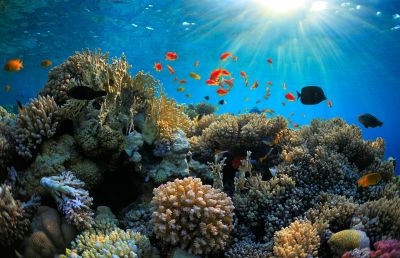Marine microorganisms and climate change

Marine microorganisms and climate change
Marine phytoplankton plays a crucial role in maintaining the well-being of our planet, conducting almost half of the photosynthesis taking place on Earth and supporting food webs. It is therefore vital to understand how climate change alters the metabolism of these microorganisms.
The aim of the EU-funded GENMARPHYTO project is to examine the links
between oceanography, cell biology and genomics. Marine cyanobacteria
are a type of marine phytoplankton that make a major contribution to
global carbon fixation and underpin the marine food web. Currently,
understanding of gene regulation in marine phytoplankton, especially
with regard to their response to environmental parameters, is limited.
Consortium members are addressing this problem, investigating different strains of marine Synechococcus (a group of photosynthetic microorganisms). The aim is to compare the responses of Synechococcus strains to environmental change and other available microbiological data. The results will enable scientists to understand why this group of microorganisms is so successful and abundant in the marine environment.
Project partners therefore are investigating which genes are involved in stress responses under stress conditions and comparing the responses of the different genes. They are also examining the connection between metabolic regulators and identifying the defence mechanisms of Synechococcus strains facing environmental or predation pressure.
Scientists found allelopathic interactions between different Synechococcus strains, whereby they produce biochemicals to influence the growth of other organisms. This discovery will increase understanding of how Synechococcus communities are structured in the marine environment.
Researchers also found that exposure to blooms of coastal marine Synechococcus changed motor control and preference behaviour in Californian black perch. In addition, predator-prey interactions between marine Synechococcus and nanoflagellates were examined to determine defence mechanisms in the face of grazing pressure.
Results from GENMARPHYTO will increase knowledge of how marine Synechococcus respond to changing environmental conditions. They will also give insight into the adaptability of the microbial community to future climate change. Furthermore, outcomes will give an indication of how this group of microorganisms can influence other organisms. This new knowledge is crucial to fully understanding the key role played by cyanobacteria in planetary carbon dioxide capture and marine food webs.
published: 2015-07-15